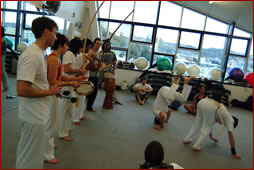
Below is Master China's own words about Capoeira and some
of the goals for New Zealand:
 Capoeira
is a sport, a martial art that teaches many important skills.
The musical side of Capoeira teaches the students about different
rhythms and another language. Capoeira
is a sport, a martial art that teaches many important skills.
The musical side of Capoeira teaches the students about different
rhythms and another language.
Capoeiristas (people who play Capoeira) learn how to
use their bodies in a new way and they develop physical fitness
and confidence levels as well. The training incorporates observation
and awareness skills, the study of body movement, appropriate
responses to various situations and a very effective form
of self-defense. Students improve their coordination, their
body, awareness and their self-expression.
The training environment that Capoeira is
learned in is challenging, fun and safe. It offers an excellent
alternative to the activities that many youth today are involved
in because of idle time on their hands and a lack of programs
to interest them and develop their talents, while still remaining
in the realm of "cool". However, as a Master who
has worked with both street kids and upper class youths, I
know that the skills they learn are very far-reaching despite
being disguised by the high level of enjoyment that surrounds
the sport/art.
Capoeira is viewed as a "cool"
cultural thing to do and thus attracts a wide variety of young
people. Widespread exposure to the youth of New Zealand could
only result in a stronger presence of Capoeira in Aotearoa.
It is an activity that students are likely to continue to
do as part of their lifestyle even when they leave school.
As a PE teacher, I know that one of the most important aims
of a PE Curriculum is to foster the awareness of the importance
of regular physical exercise. I firmly believe that Capoeira
provides an excellent alternative or complementary to traditional
sports.
I am also aware of the implementation of
dance in New Zealand Curriculum. As Capoeira is recognized
as a dance, an art and a martial art it is sometimes difficult
to categorize it. As a Master of Capoeira I teach my students
two other forms of dance that go alongside Capoeira. Maculele
and Samba de Roda are two dances that are done in the
Roda (circle) of Capoeira. These dances are used
to elevate the mood and set the rhythm of the ensuing games
to be played. At the end of 2001 most schools received
an educational publication addressing dance in schools written
by Ralph Buck of Otago University. One of the accompanying
articles refers to Capoeira as movements outside standard
rhythmical structures. The music and vocals are applied as
a "beautiful tool of atmospheric manipulation".
The Influences of Capoeira as a support to sport teams:
As a teacher in Brazil Master China taught
a wide variety of students both male and female.
However, in Brazil, one of the most common forms of group
participation was sport teams. It is well documented now that
dance-like training improves an athletes' eye, hand and foot
coordination which directly translates to an improvement in
other sporting endeavors. As a carded Professional Soccer
Coach Master China can personally attest to this.
Playing Capoeira involves learning set movements that the
players then have to piece together themselves and improvise
to play out of their opponent's way. Because it is a very
fun activity played one on one, and to music, Capoeira has
a mass appeal. Girls can play boys and vice versa. The interaction
is literally moving art.
The Graduation System in our group:
Regular students can be recognized if they
desire so. In Capoeira belts can are awarded as in any martial
art. To check our school's Grading System click
here.
The Difference between Capoeira and the other Martial Arts:
What sets Capoeira apart from other martial
arts is the intention of the game. When two people play with
each other their aim is not to hurt one another. There is
no intentional aggressive contact. Each player "shows"
the other players "gaps" by moving inside and pretending
to get the other. This is the "game" that is a series
of tricks played on one another to trap your opponent. The
finesse of the game is the ability to move out of the way
with originality and dramatic effect and defend with a counter
attack all in one sequence of moves.
Master China owes and manage the Association
of Schools of Capoeira.
I would really love to have our classes in your school. Currently
I work with four Tertiary Institutions and a couple of colleges
and a dance studio. I feel that having our program in schools
is really the best way through to develop Capoeira in New
Zealand. We can incorporate classes as weekly lessons or we
can run workshops at camps, after school, etc.
We look forward to hearing from you in the
near future. Please call us if you have any further questions
about Capoeira. A display can be arranged at your school if
you wish to see Capoeira first hand.
|